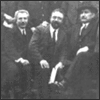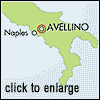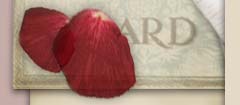Home > War Bride Stories > Anna (Perugini) Lavigne
 |
| Click image for larger view. Anna Lavigne (left) in a picture taken before the War. Photo courtesy of Anna and Aurele Lavigne. |
 |
| Click image for larger view. Anna's father (center) with a group of anti-Fascist intellectuals in Avellino. Photo courtesy of Anna and Aurele Lavigne. |
 |
| Click image for larger view. Map locating Avellino, Italy. |
Only twenty-six Italian women married Canadian servicemen during World War Two and Mrs. Anna (Perugini) Lavigne of Bathurst, New Brunswick, was one of them.
When the war started, Anna was a 20 year-old student studying English at the University of Naples. As one of seven daughters of a prominent Italian surgeon, education was important in the Perugini family: there was absolutely no question that Anna, her sisters and one brother would leave Avellino, a city located south of Naples, to attend the University in quest of a higher education.
Anna's father was a fascinating man whose intellectual pursuits exposed his family to ideas which were not exactly popular in fascist Italy at the time. One of a dozen prominent academics and professionals who would meet regularly to discuss philosophical questions, Dr. Perugini carried on long-standing correspondences with some of Italy's leading thinkers, including well- known philosopher Benedetto Croce. Anna's father also had a reputation for kindness and benevolence, and he routinely provided medical services for free to those who could not afford it. Naturally, the Perugini family was very well-known in Avellino: they had a beautiful apartment filled with books and musical instruments and they owned a farm outside of the city.
As Anna says, "At that time, it was not so much as today, but in those times fifty years ago, a doctor was kind of on a pedestal and there was a very large division between the lower and the higher caste."
After Anna's father died in January, 1940, things changed drastically in the Perugini family. The loss of her husband, combined with the stress of managing such a large family in wartime conditions, proved to be an awful burden to Anna's mother. Mrs. Perugine was soon overcome by a nervous condition, one that was exacerbated by the tides of war. Anna left university and remained in Avellino to be close to her family.
Life went on as normal as can be expected until the invasion of Sicily in July, 1943. The swiftness with which the Allies moved up the boot of Italy surprised everyone, including Anna. There was also great fear, because the Germans stationed in Avellino made the city a target for Allied bombing. Anna's mother could see the writing on the wall, and in August, she left for the mountain farm. The first week of September Mrs. Perugini sent a message demanding that the children come join her in the safety of the mountains.
Anna remembers that time very well. Her mother was terrified, and she ordered the children out of Avellino: "I'll buy you a suitcase," her mother pleaded, "You pack what you want. I want you to move to the country!"
Living on the farm provided a certain measure of safety: there was food and in a sense they were better off than people in the cities, but it did not mean that the children were totally out of danger. German soldiers lived close by in military barracks, and the villagers had to put up with Germans coming around to their homes, sometimes twice a day, looking for anything valuable. Anna remembers,"If you had a ring, or a chain of silver, or something of value, perfume or nylons," the Germans would come in and demand it. "They used to come in and scare you to death," she says.
Anna recalls an uncle who had a gun pointed to his head over a bottle of perfume that belonged to his daughter. He got such a fright that the very next day his hair turned completely white.
Within one week of the family's arrival at the family's mountain farm, the predicted Allied bombing of Avellino began. An air raid by British spitfires on September 14, 1943, holds particularly bad memories for Anna. From their mountain position, they could see the entire bombardment of Avellino from beginning to end. ..Next
Back to Top
|






